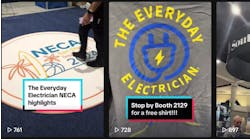Tips for Electrical Contractors Looking to Grow Their Residential Business
Electrical contractors need to be ready to take advantage of business opportunities in the residential market, as more people now than ever are not only living at home, but also working and learning from there, drastically increasing the home's electricity needs. The NECA presentation “How Contractors Can Grow Their Residential Business in the New Electric World,” presented by Bradford Wills and Ansul Rajgharia of Schneider Electric on the first day of NECA 2021, showcases current trends in residential electrification and how ECs can help fill a void in the market.
Some of the challenges that the residential market currently faces include increased CO2 emissions, property damage due to electrical fault, residential electricity bills, opportunities for work from home, and people wanting to age in their home. Meanwhile, electrical contractors are in a unique position to be the ones who can deliver a lifetime of solutions to homeowners, says Wills, who is responsible for the strategy and business execution of Schneider Electric’s Home and Commercial division. These solutions include connected/smart home devices, electric vehicle charging solutions, solar and storage, and services such as security, energy, and automation.
“The concept of the home is changing,” says Rajgharia, business development director for the company's Square D Residential Connected Products and Surge, citing how the COVID-19 pandemic has altered the electricity needs of homes. They must now be suited for work, school, play, health, etc., which requires greater resiliency. Additionally, Wills says environmental concerns and the rising prevalence of millennial homeowners and buyers also means an increase in the need for sustainable home solutions.
These trends can be intimidating, especially for an industry that Wills says is used to installing hardware and leaving it. However, looking toward the future, electrical contractors can use these electrical trends to ensure continued business opportunities, as these homes’ efficient, connected, and resilient electrical solutions will require a lifetime of service opportunities. “Instead of looking at each home you service as a one-time thing, think of it as a lifetime opportunity,” Wills says.
In conclusion, Wills and Rajgharia share four primary steps for growing an EC’s residential business to meet the increased electrical needs of “homes of the future” that are resilient, hyper-efficient, personal, and sustainable.
- Learn new skills. These include smart home and security installation, digital app setup and commissioning, and more.
- Differentiate your business. An example includes consulting on home electrical/energy needs.
- Stay relevant. Build a lifetime relationship with customers, leverage digital tools, etc.
- Offer new services. These may include energy monitoring, security, and storage.




